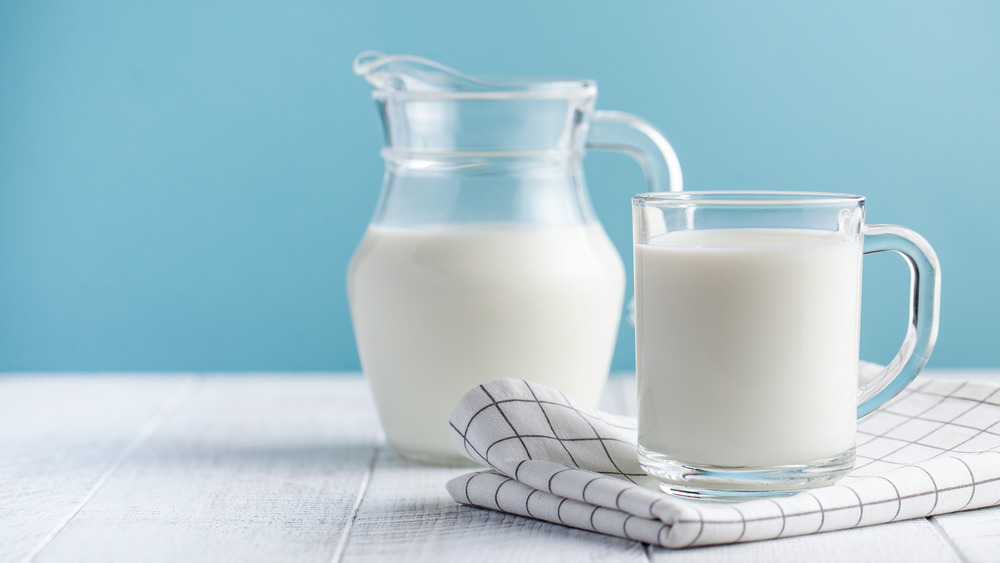The Surprising Way Humans Developed A 'Milk Gene'
Let's face it: drinking milk is weird. It's not meant for us. It's meant for baby cows. So why do we do it? Because it's delicious, that's why. What else are you going to soak your cereal in? Almond milk? Get real.
Unfortunately for the humans who first realized the deliciousness of milk, their lack of the gene needed to process it may have given them a bumpy ride, digestively speaking. According to Science magazine, we developed this gene as a species sometime in the last 6,000 years. Scientists found this out by examining the teeth of skeletons found in Kenya and Sudan belonging to people who herded cows, goats, and sheep anywhere from 2,000 to 6,000 years ago. They scraped the minerals off the teeth and found milk proteins on them. The findings are the earliest evidence we've come across so far of people drinking dairy in Africa, and most likely the whole world. However, these bones belonged to people who didn't yet have the genetic mutation necessary to process milk. "It looks like the community was drinking milk before they had lactase persistence," said a Madeleine Bleasdale, who co-authored the study.
So how did they stomach the stuff if they couldn't digest it? The authors of the study said that the proteins may have come from fermented milk products, such as yogurt. Fermentation can break down the milk sugars, making them easier to digest.
The 'milk gene' was probably the result of natural selection
Although humans didn't originally have the genetic apparatus to process the sugar in milk, called lactose, it appears to have been an open-and-shut case of Charles Darwin's theory of natural selection. Our bodies realized we could get more nutrients from milk, so the genes to process it — via an enzyme called lactase — began to mutate and become dominant. This gave some people an evolutionary advantage. "Among these people, any individuals with lactase persistence would live longer and have more children," said Washington University archaeologist Fiona Marshall, who was not a researcher in the original study.
But milk's deliciousness may not have been the only reason pre-lactase persistent people took to drinking it. Drinking milk can be a great way to get through drought. It allows people to extract nutrients from their herds without killing any animals and thinning out their stocks. "If you have cows, you have a source of liquid and proteins and nutrition," said Sarah Tishkoff, a geneticist at the University of Pennsylvania. "As long as you can keep your cattle alive, of course." It looks like science has finally settled the chicken-or-the-egg debate that had surrounded the milk gene question: the cultural practice of drinking milk is what caused the genetic mutation that allowed all of us to enjoy our Fruit Loops in front of Saturday morning cartoons.
White supremacists have tried to call dibs on the 'milk gene'
Over the years, white supremacists have tried to appropriate scientific finds and pseudoscientific mumbo-jumbo to support their ridiculous claims that they are better than other people because of the color of their skin. They've tried it with eugenics, which aimed to improve people's genetics by controlling breeding, and phrenology, which claimed to tell people's intelligence via the size and shape of their skulls. Now, they seem to be running out of ideas. According to The New York Times, white supremacists have been claiming that white Europeans are the only ones who have the milk gene. Evolutionary biologist John Novembre has been tracking this new misinterpretation of genetics, showing how people on social media use the science to fit their false narratives. One social media account named "Enter The Milk Zone" used an article from a scientific journal that found a milk gene mutation in European cattle herders 5,000 years ago to back up its ridiculous posts that read: "If you can't drink milk, you have to go back [to Africa]."
The recent findings from Africa prove this weird narrative to be egregiously false. And the milk-chugging white boys' narrative isn't only dangerous to society, it also has negative effects on the science it misquotes. "Studying human genetic diversity is easier in a society where diversity is clearly valued and celebrated," said Novembre. "Right now, that is very much on my mind."


